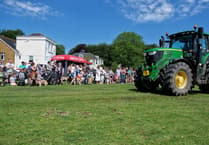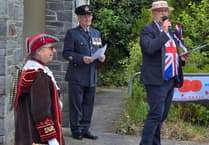NINE hundred years of history is at stake in a West Devon village where the Kelly family are fighting to keep their ancestral home.
Kelly House at Kelly is so old it is mentioned in the Domesday Book and tonight (Thursday) at 8pm it will feature in Channel 4's Country House Rescue as it struggles to survive in the 21st Century.
Presenter and hardheaded businesswoman Ruth Watson visits the house to help the 31st Squire of Kelly, Warin Kelly, his wife Elizabeth and daughter Sophie, come up with an action plan to try and create an income for the property
With inheritance tax to pay and major restoration needed on the building, the family are on the verge of bankruptcy but are willing to try anything to keep the Kellys at Kelly House.
Sophie, 27, explained: 'Dad recently inherited this place from my grandmother but it is in quite bad condition. You could sink £3-million into this and not see anything for it. It will take many millions to restore it and on top of that we have a massive inheritance bill to pay.
'Every penny we earn we are putting into it, but unless we come up with a way of making money here we will have to sell up.'
Sophie and boyfriend Chris came back to Kelly to try and find a solution to keep the house which has been in the family for 900 years.
'I do not want to tell my children and grandchildren that we sold the place because that was the easy option. I would rather say we tried this and it went horribly wrong and that is why we sold it. We are desperate to try and keep it.'
Martin de Kelly was the first of the family to live at Kelly in 1100 and by the reign of Henry II, some 50 years later, Nicholas de Kelly held a manor there and was one of the eleven Devonshire families responsible for raising fighting men for the king in return for their landholding.
Sir William de Kelly began to build the church right by the house in 1252 and many family members are buried there.
When the Rev Maitland Kelly took over the estate in 1900, for some of the 37 years he and his family lived there he was Rector of Kelly as well.
By 1742 Arthur Kelly of Kelly was prosperous enough to replace part of the old pre-Tudor house with the elegant early Georgian building with its graceful staircase, which is there today.
Through the 19th Century the family continued to live the lives of prosperous country squires, devoted to their estate and with a close relationship to the people who lived in the hamlet and farms on it.
Even the existing lock-up demonstrates the traditional gentry role of maintaining local law and order as Justices of the Peace.
The 20th Century brought the problems faced by so many smaller country houses — some of the estate had to be sold and maintenance had become a constant drain on resources.
Sophie Kelly said it was a case now that many people who lived in the area were not even aware of Kelly House: 'Ruth's main aim was to see Kelly be part of the community again. When Gran lived here she only had friends and family around but I think we realised that we would have to start opening Kelly House to the public.
'The programme has kick-started us into doing something that would have probably taken us five years to get around to doing.'
Thanks to Country House Rescue, the Kellys have welcomed help from the Prince's Foundation for the Built Environment, which has been able to use the house as a training venue, and students on the surveying and environment course run by Plymouth University.
Their work has enabled some restoration to take place, including a grand tudor fireplace which is big enough to stand a person each side of the fire.
Other stunning features include the Georgian staircase with gold stars on the ceiling and the tea room in the oldest part of the house.
Duke of Edinburgh participants at Kelly College, which was founded by another member of the Kelly family, Admiral Benedictus Marwood Kelly in 1877, will be helping to restore the grounds around the house.
The first open days will be held on May 2 and 3 and volunteers are being sought to help serve the teas and show people around the house. They will be paid in cake, added Sophie. Admission to the estate is £5 per person.




Comments
This article has no comments yet. Be the first to leave a comment.